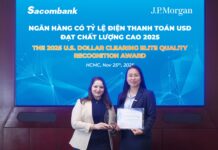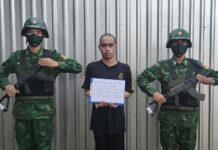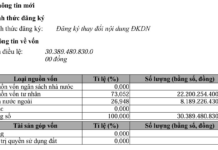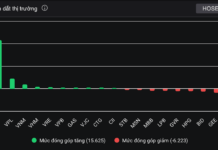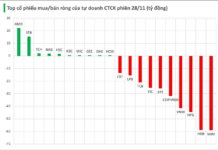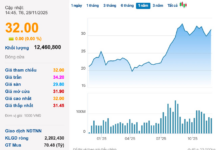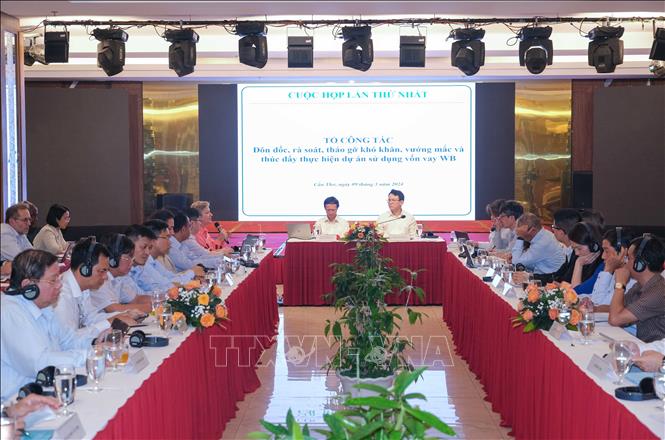
Meeting scene.
According to Mr. Pham Hoang Mai, Director of the Foreign Economic Department of the Ministry of Planning and Investment, Vietnam currently has 13 WB loan agreements being implemented, with a capital of 2.42 billion USD. There are 40 projects preparing for implementation with a capital of 3.22 billion USD. Among them, the WB is mainly interested in potential projects in the energy sector, renewable energy, railway projects to improve safety and connect Ho Chi Minh City – Can Tho, urban railway in Hanoi, digital conversion projects, emission reduction projects, support for the development of 1 million hectares of high-quality rice production and low methane emission projects, urban development projects…
In addition to the achievements, Mr. Pham Hoang Mai said that the process of implementing WB-funded projects still faces difficulties such as the quality of project preparation is not good, unclear in determining the competent agency due to legal loopholes; especially when implementing projects in many localities. Difficulties in investment authority between the central or local budget, distinguishing between investment and regular expenditures in some sectors are not clear…
Another challenge mentioned by the representative of the Ministry of Planning and Investment is that the WB is relatively deeply involved in the technical aspects of the implementation process of projects in Vietnam through giving suggestions, sending non-objection letters. Vietnam still has limitations such as the limited capacity of the project owner; limited budget and resources leading to a lack of corresponding capital, insufficient project personnel; delays in compensation, land clearance and resettlement…
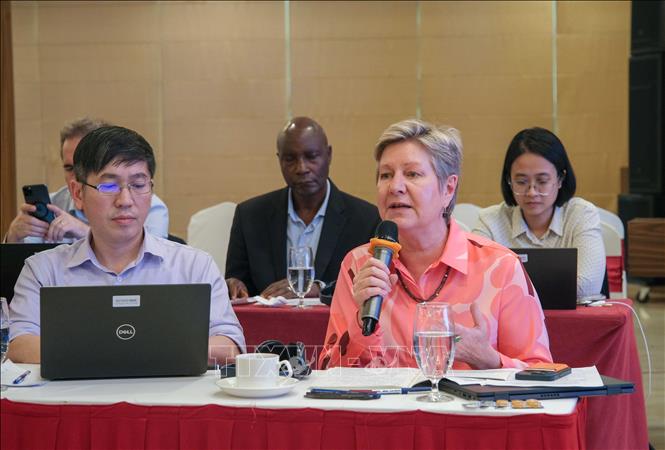
Mrs. Kathleen A.Whimp, Country Manager of the World Bank Project, talking at the meeting.
Mrs. Kathleen A.Whimp, Country Manager of the World Bank Project, in Vietnam, East Asia, and the Pacific, agrees with the Ministry of Planning and Investment’s assessment that the time frame for implementing projects is still long. For example, the time frame for project evaluation and appraisal work is delayed, so it is necessary to consider how to shorten the time.
According to Mrs. Kathleen A.Whimp, the World Bank Vietnam also has difficulty in changing the scope of projects as it must comply with the decision of the World Bank Board of Directors. “The World Bank team in Vietnam is very flexible in negotiating loan agreements, but the difficulty is that we need a formal request from the Government of Vietnam to submit our proposals, based on the general legal framework of the World Bank,” Mrs. Kathleen A.Whimp said.
Similarly, once a loan agreement is signed, it will become an international agreement and during the project implementation process, it must comply with the regulations of the World Bank and international law. In reality, during the project implementation after the loan agreement is signed, it still adheres to Vietnam’s commitments but in practice, there are still obstacles related to national laws.
The World Bank representative hopes that Vietnam’s partners, including the Ministry of Justice and the units in charge of projects, investors, and ministries, will discuss these issues specifically with the World Bank to find ways to resolve the inconsistencies between the regulations of the World Bank and Vietnamese law.
Regarding the views of the World Bank representative, Deputy Minister of Planning and Investment Tran Quoc Phuong said that regarding the procedures, regulations, and legal provisions of ODA projects, Vietnam is currently in the process of amending related laws. In which, the State Budget Law is also in the process of summarizing and soon there will be a roadmap to amend this law; in which there is also a part related to ODA.
In addition, between the Public Investment Law and the Public Debt Management Law after a period of implementing the law from 2019 to now, there are still legal difficulties. Currently, the Government is requesting further review to compile the difficulties for revision and especially related to ODA projects.
Deputy Minister Tran Quoc Phuong said that the guiding principle of the Ministry of Planning and Investment is to continue to simplify the procedures of ODA, to simplify to the maximum extent possible in order to expedite the implementation. Because ODA always has the characteristic of applying regulations from both the domestic and partner sides and finding solutions to reconcile legal regulations and procedures for both sides is a priority
However, Mr. Tran Quoc Phuong also said that this is a difficult task, not to apply once for all partners. This is an ongoing task, but it cannot be done quickly because the process roadmap is complex.
To overcome difficulties, accelerate project progress, ministries, sectors, and localities propose that the WB coordinate with the Ministry of Planning and Investment, the Ministry of Finance to review ongoing projects with proposals for adjustment (using surplus capital, extending project implementation time…), evaluate and provide comments on proposals from agencies and localities.
Also, coordinate with project owners to review proposals that require feedback, non-objection letters from the WB, determine the deadline for completion, and notify the results of the resolution to the Working Group. For new projects, the WB coordinates with the Ministry of Finance and the managing agencies to expedite the completion of negotiation procedures and sign loan agreements. Along with that, the delegates also propose that the WB, in collaboration with the Ministry of Planning and Investment and the Ministry of Finance, build potential projects; review the process to streamline procedures, the ability to harmonize procedures for Vietnam such as bidding procedures and policies on environment – society, land clearance, and resettlement…







